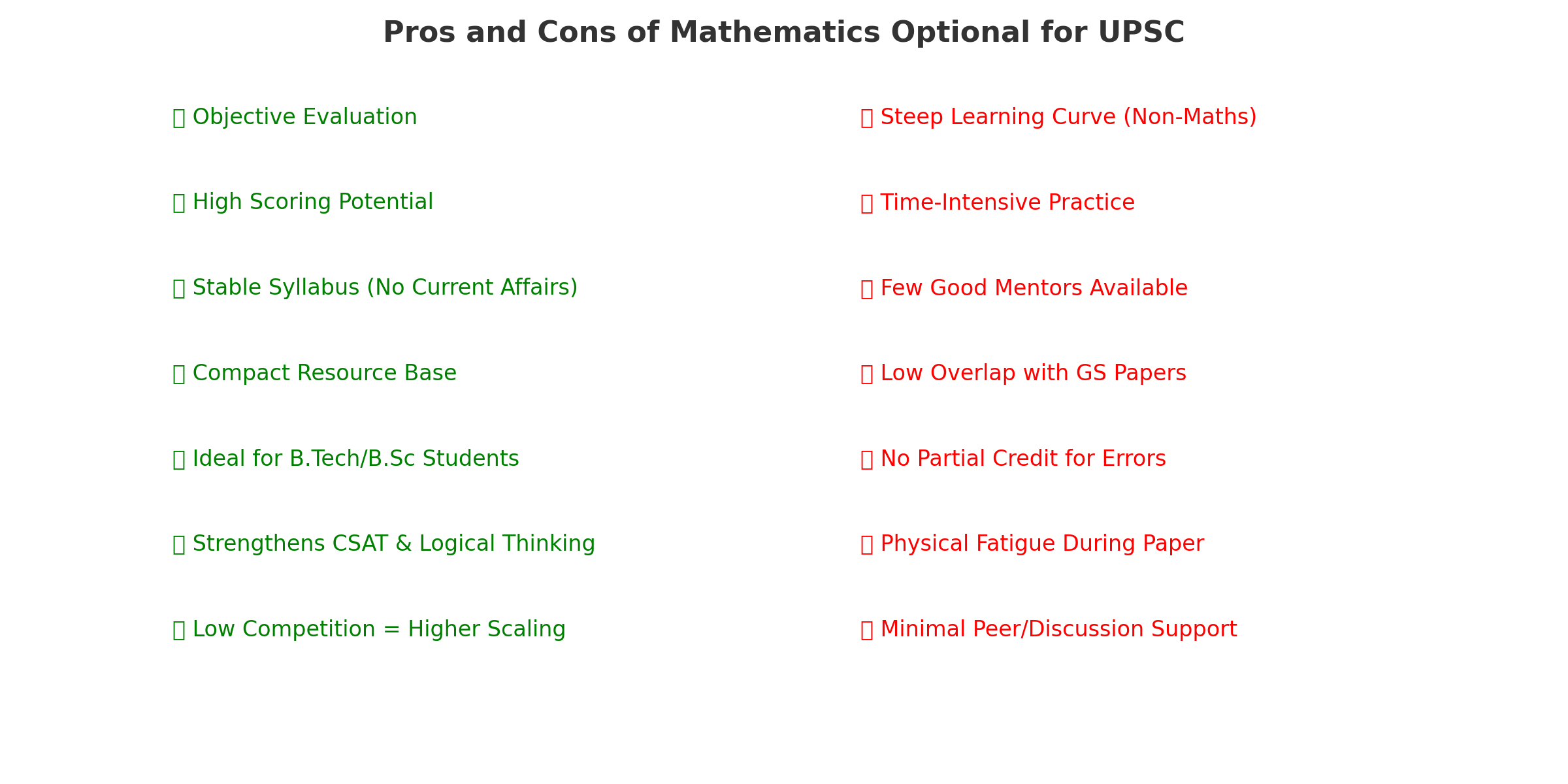
Pros and Cons of Maths optional ?
Every UPSC aspirant reaches a crossroads while selecting an optional subject. The decision can be confidence-boosting or career-altering, because 500 coveted marks in the Mains examination rest on this single choice. Mathematics often appears simultaneously promising and daunting: promising because numbers feel objective, daunting because a slip can feel fatal. In this detailed article we unpack the pros and cons of taking Mathematics as your optional for UPSC 2026 (and beyond), demystify long-held myths, and suggest practical guardrails if you choose to walk the numerical path.
1. Syllabus Overview—What Exactly Are You Signing Up For?
Before weighing pros and cons, it is important to know the ground you will cover:
- Paper I: Linear Algebra, Calculus & Analytic Geometry, Ordinary & Partial Differential Equations, Vector Analysis, Dynamics & Statics.
- Paper II: Real Analysis, Complex Analysis, Linear Programming & Numerical Methods, Abstract Algebra, Fluid Dynamics, Mechanics & Relativity.
The syllabus is roughly equivalent to what a B.Sc. Mathematics graduate studies over three years—compressed into 12-14 high-stake questions per paper. Now let us inspect why that can be both a blessing and a curse.
2. The Pros—Why Maths Appeals to Many Serious Aspirants
2.1. Objectivity & Predictability of Evaluation
Unlike humanities optionals—where subjective interpretation, presentation style, or examiner bias can affect scores—Mathematics answers are either right or wrong. If you integrate correctly, prove a theorem neatly, or optimise a linear programme, you clinch full marks. Objectivity breeds predictability; disciplined practice tends to translate directly into marks.
best maths optional coaching for upsc
Best maths optional teacher for UPSC
Best maths optional test series
2.2. High Scoring Potential & Historical Toppers
Repeatedly we see Mathematics toppers punching 330+ out of 500: think of AIR-4 Gaurav Agarwal (2013) or AIR-1 Nandini K.R. (2016) who clocked 327. When GS papers turn unpredictable—as they often do—Maths optional can become the great equaliser that lifts a candidate into the interview list.
2.3. Minimal Overlap with GS but No Current-Affairs Volatility
GS papers evolve with Budget, geopolitics, pandemics, and Supreme Court verdicts; Mathematics remains stoic. A Rankine vortex behaves the same whether the economy booms or slumps. This stability protects you from syllabus creep: once mastered, concepts rarely need yearly relearning.
2.4. Compact & Finite Resource Base
For history or sociology, bibliographies sprawl across dozens of authors and journals. For Maths, the “holy trinity” of Schaum’s Outlines, Kreyszig, and Shantinarayan plus PYQs can suffice. No weekly magazines, no ever-expanding PDFs—just algorithms, theorems, and sweat equity.
2.5. Synergy with Certain Backgrounds
B.Tech, B.Sc., and engineering graduates who already survive JEE or GATE find the syllabus refreshingly familiar. Mental muscle memory accelerates revision cycles, freeing time for Ethics and Essay preparation.
2.6. Quantitative Confidence for Prelims CSAT & Service Tenure
A rigorous Maths routine sharpens logical thinking, invaluable not only for breezing through CSAT but also for data-driven policymaking once in service—think budget analysis, statistical inference, and evidence-based program design.
2.7. Limited Competition—A Hidden Advantage
Only about 3-4 % of candidates opt for Maths. Fewer aspirants mean fewer “rank sharks” fighting in your pool, which can marginally improve scaling outcomes when compared with crowded optionals like Sociology. The UPSC scaling algorithm rewards outlier excellence, so a standout 330 can catapult you past hundreds stuck in 260s.
3. The Cons—Where Maths Optional Can Trip You Up
3.1. Steep Learning Curve for Non-Math Backgrounds
If your last formal tryst with mathematics ended in 12th grade, expect an initial shell-shock. Topics such as Real Analysis or Abstract Algebra demand conceptual depth far beyond school calculus. Building that foundation from scratch can steal months that your peers invest in Essay finesse or Ethics reading.
3.2. Time-Intensive Practice & Answer Presentation
A single 20-mark proof can require two pages of equations and three diagrams. During Mains, you have 180 minutes to answer each paper—barely ten minutes per question. Speed writing without cognitive errors demands relentless rehearsal. Daily GS answer practice and Math derivations together can overload your schedule.
3.3. Limited Faculty & Peer Support
While Delhi teems with teachers for Public Administration or Anthropology, quality Maths mentors are scarce. Joining an ill-matched coaching class can lock you into misaligned pedagogy. Study-group culture is also thinner; you may spend nights debugging Fourier series alone.
3.4. Zero Partial Credit for Near-Miss Answers
In humanities, even a partially correct analysis can salvage 2-3 marks. In Maths, an erroneous sign can nuke an entire 15-mark solution. Accuracy risk is binary; casual error margins cannot be absorbed.
Best ias coaching in hindi medium
Bests mentorship programme for upsc
Best ias coaching in chandigarh
3.5. Minimal Overlap with General Studies
Polity optional overlaps heavily with GS Paper 2; Geography helps in GS Papers 1 & 3. Mathematics seldom intersects with any GS paper except perhaps a trickle of statistics in Economic Survey charts. Hence you enjoy no “dual-use” dividends for your 500 extra hours of labour.
3.6. Scaling Uncertainty & Subject Ceiling
Though Maths has high raw-score potential, UPSC’s scaling algorithm can compress marks if average performance shoots up in a particular year. Rumour mills report occasional “ceilings” because evaluation is rigid: a 350 might scale down to 320 even if you aced every answer.
3.7. Physical Strain—Handwriting Endurance
Swirling integrals and matrices can cramp your wrist well before the three-hour bell. If your handwriting degenerates into hieroglyphs, examiners may deduct presentation marks. Orthopaedic fatigue thus becomes a genuine performance factor.
4. Myths vs Reality—Clearing the Fog
Myth 1: “Only IITians Score High in Maths.”
Reality: Many B.Sc. graduates from tier-2 universities have scored 300+ through systematic practice. Conceptual clarity matters more than institutional pedigree.
Myth 2: “UPSC Dislikes Quantitative Optionals and Caps Marks.”
Reality: The scaling algorithm adjusts relative performance. If a large cohort does exceptionally well, scaling compresses everyone marginally. But standout scripts remain in the top percentile; they still secure interview calls.
Myth 3: “There Is No Need to Write Full Steps—Final Answer Counts.”
Reality: Examiners award granularity: method, rigour, and notation earn partial marks. Omitting steps risks zero credit if your final answer is numerically correct but procedurally opaque.
5. Decision Checklist—Should You Choose Mathematics?
- Educational Background: Did you enjoy and excel in Maths during graduation or plus-two?
- Time Budget: Can you spare 12-15 hours weekly for rigorous practice without starving GS?
- Access to Mentorship: Are reputed faculties/coaching (e.g., IMS, PlutusIAS Maths batch) accessible online or offline?
- Psychological Temperament: Do numerical setbacks demotivate you or galvanise you?
- Handwriting & Speed: Can you write legibly at 25–30 steps per page for three straight hours?
If you tick four out of five boxes, Mathematics can be your strategic weapon. Otherwise, weigh allied optionals—Physics, Statistics, Economics—which might align better with your aptitude.
6. Success Blueprint—If You Commit to Maths
6.1. Micro-Planning the Syllabus
Break each paper into weekly targets: e.g., Week 1—Matrix Algebra; Week 2—Eigenvalues; Week 3—ODEs. Use Gantt charts or Excel trackers to visualise progress—math minds love dashboards!
6.2. Source Curation—Less Is More
- Linear Algebra: Hoffman & Kunze (theory) + Krishna Series (practice)
- Calculus & Analysis: Shantinarayan + Bartle (Real) + Churchill (Complex)
- Differential Equations: M.D. Raisinghania + Simmons for ODE intuition
- Mechanics & Fluid Dynamics: F. Chorlton + Murray Spiegel (Schaum)
6.3. PYQ Integration
From day one, solve previous 20 years’ questions topic-wise. Paste photocopies near study desk. Visual recall of PYQ patterns helps you forecast examiner moods.
6.4. Mock Tests & Evaluation
Join a test series by February 2026: attempt one full paper fortnightly, rising to weekly by July. Use coloured pens to annotate mistakes during review; maintain an Error Ledger where each slip is logged and revisited.
6.5. Answer Presentation Hacks
- Box final results.
- Use vector arrows, not boldface, for clarity.
- Number theorems or lemmas sequentially (T1, T2 …).
- Write brief, italicised explanations: “Since the series ∑ un is absolutely convergent …”.
6.6. Health & Endurance
Incorporate hand-stretch drills (e.g., finger flexors, wrist rolls) between practice sessions. A cramped wrist can sabotage months of preparation.
7. Perspective from Toppers & Evaluators
“Maths optional rewards clockwork consistency. I solved each PYQ thrice—first slowly, then timed, then blindfold recall. That ritual alone added 40 marks to my second attempt.” — AIR-16, 2023
Veteran evaluators highlight neatness: “Scripts that underline steps and keep margins wide make checking faster and subconsciously feel more correct.”
8. Final Verdict—Balancing the Equation
Mathematics optional is a double-edged sword. Its objectivity, high ceiling, and compact resources can propel you into the top 50 if you possess conceptual clarity and handwriting stamina. Equally, its unforgiving accuracy demands iron discipline; one careless denominator can collapse a 20-mark answer.
In essence, choose Maths if:
- You relish problem-solving and view equations as logic puzzles.
- You have at least a year before Mains to master advanced topics.
- You can secure structured mentorship and will commit to relentless mock practice.
Reconsider if:
- Your last calculus class feels like ancient history.
- You struggle with speed-writing clean derivations.
- You need an optional that reinforces GS content (e.g., Geography, PSIR).
The UPSC journey is marathonic, not just cerebral but psychological. Pick an optional that sustains your curiosity on gloomy days—one whose textbooks feel like companions, not shackles. If Mathematics sparks that joy, sharpen your pencils and let the integrals roll.
May your calculations be precise, your error term negligible, and your final score exponential!
« Which is the Best IAS Coaching in Delhi Do IAS institutes in Delhi provide postal learning materials for UPSC CSE preparation? »



